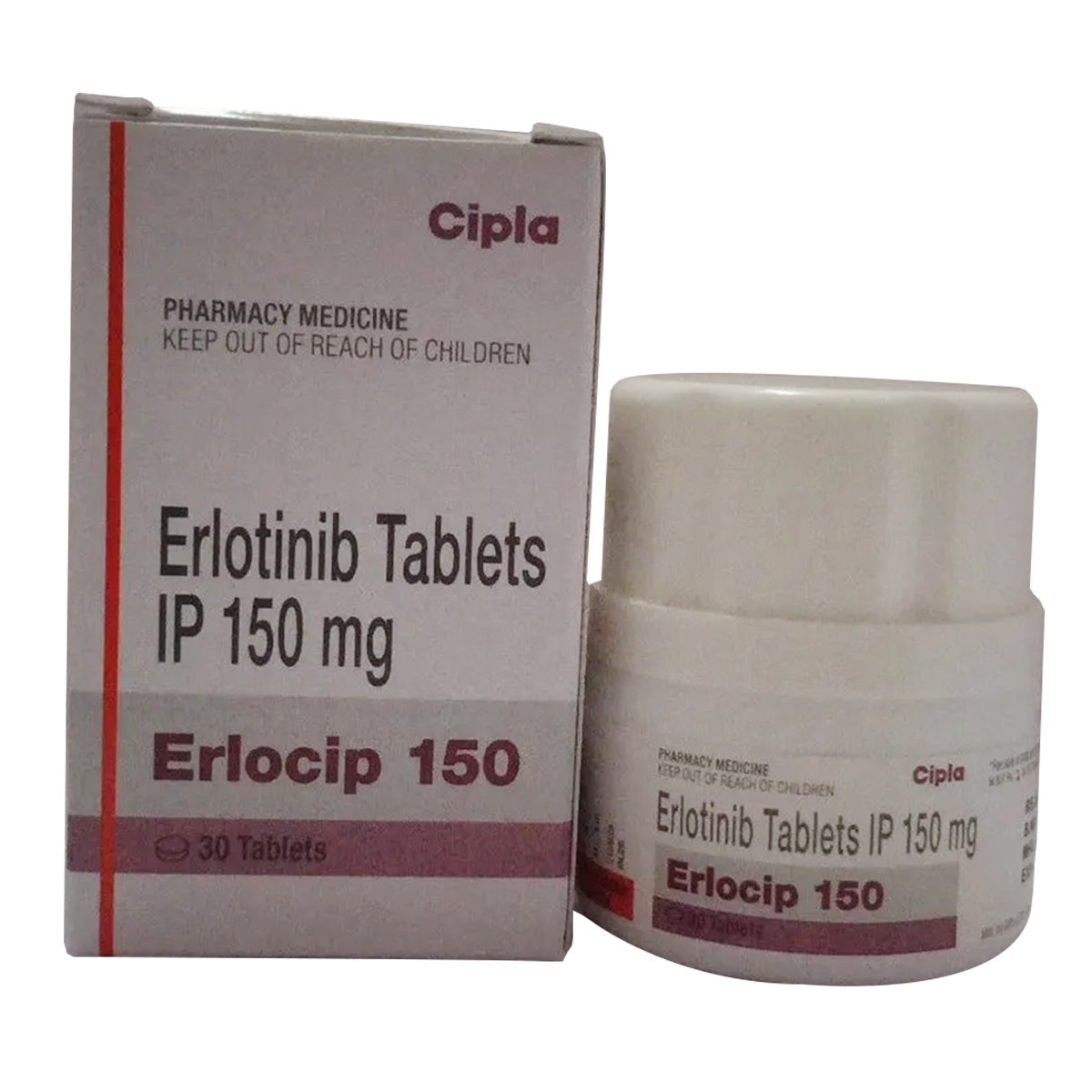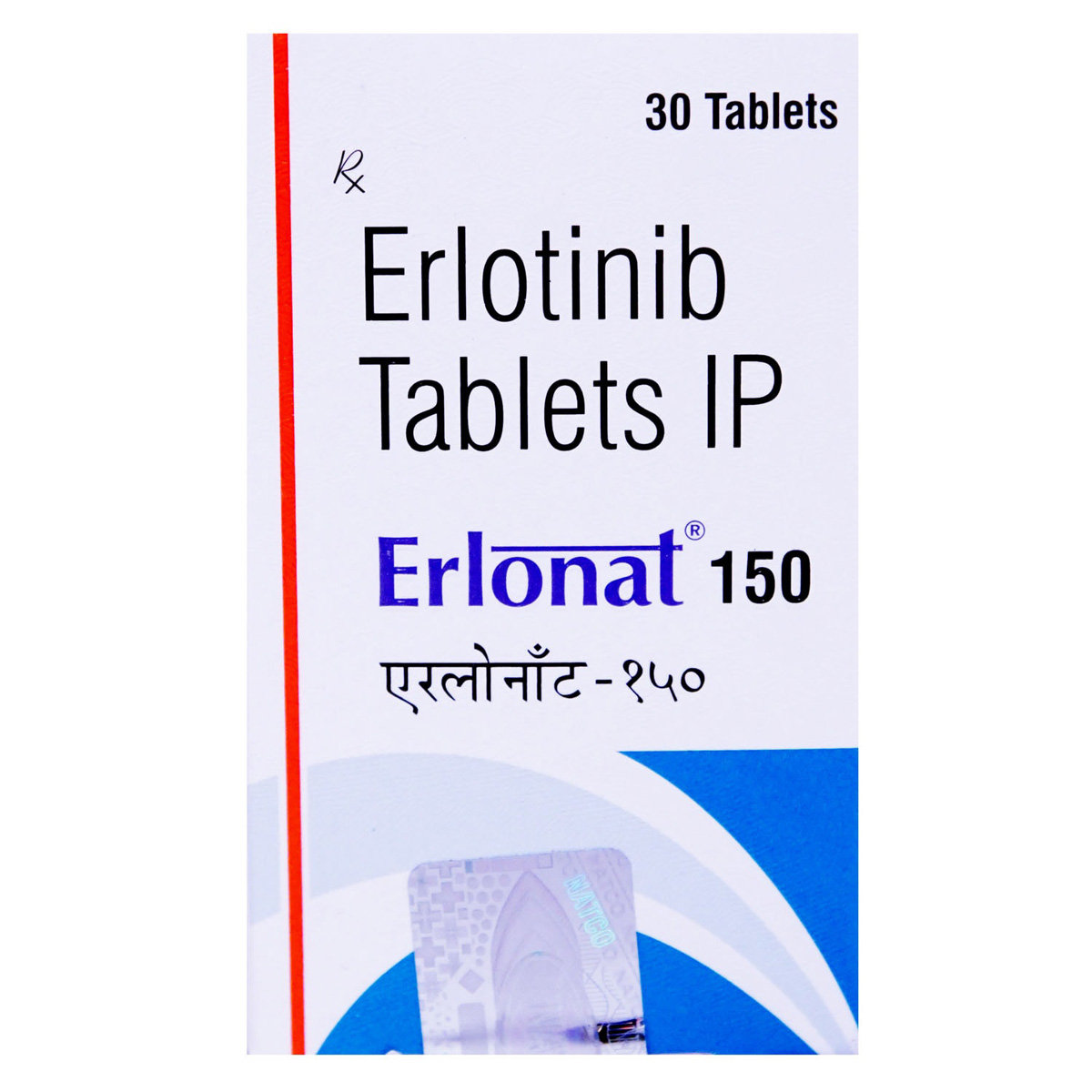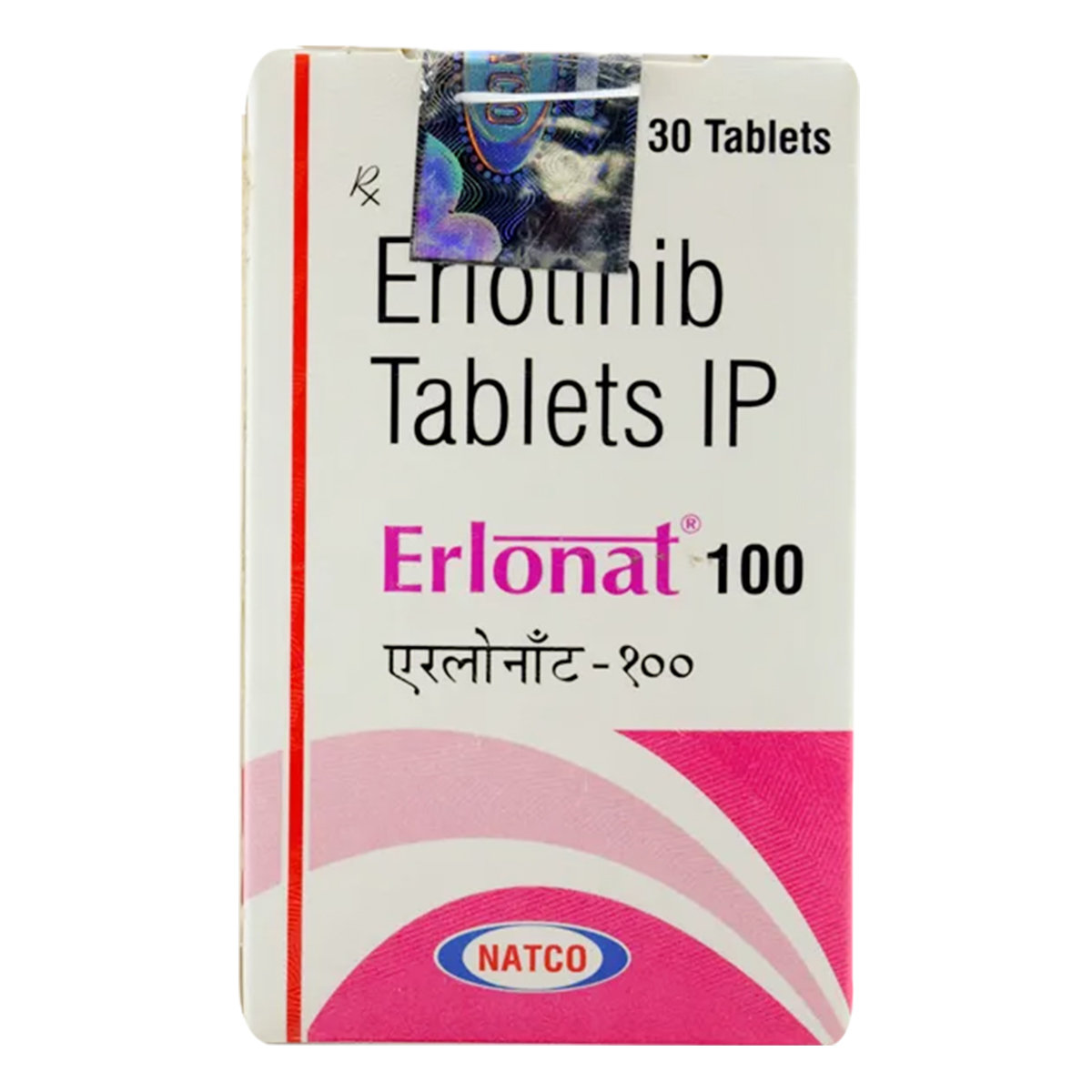Erlotinib
About Erlotinib
Erlotinib belongs to the group of medicine called ‘anti-cancer’ primarily used for lung and pancreatic cancer treatment. Lung cancer is the uncontrolled growth of abnormal cells in one or both lungs. These abnormal cells do not carry out normal lung cell functions and do not develop into healthy lung tissue. In this disease, cells of the lung grow uncontrollably, and if not detected at an early stage may spread to other body parts, including the brain. Pancreatic cancer is an uncontrolled cancerous growth in the pancreas, usually in the cells that produce insulin.
Erlotinib contains 'Erlotinib' that belongs to the group of medicines known as 'kinase inhibitors'. It works by stopping the action of an abnormal protein that causes the multiplication of cancerous cells. In this way, it prevents the spread of cancerous cells.
Take Erlotinib as prescribed by your doctor. You are suggested to take Erlotinib as long as your doctor has prescribed it after checking your medical condition. In some cases, you may experience certain common side-effects such as abdominal pain, bone pain, breathlessness, constipation, cough, diarrhea, edema (swelling), fatigue, fever, infection, muscle pain, nausea, rash, stomatitis (inflammation of the mouth), vomiting, weight loss abnormal blood tests for the liver function. Most of these side-effects do not require medical attention and will resolve gradually over time. However, you are advised to talk to your doctor if you experience these side-effects persistently.
To treat your condition effectually, continue taking Erlotinib for as long as your doctor has prescribed. Do not take Erlotinib if you are pregnant or planning for pregnancy and breastfeeding as Erlotinib causes serious congenital disabilities. Older adults are more sensitive to medicine so that they may adjust the dosage according to the condition. While taking Erlotinib, you might become more sensitive to sunlight, so it is important to protect your skin with a high sun protection factor (SPF). Regular blood tests are required to monitor liver function and blood cells in the blood while taking Erlotinib. Avoid consuming alcohol along with Erlotinib as it could lead to increased dizziness.
Uses of Erlotinib
Medicinal Benefits
Erlotinib is prescribed to the patients dealing with nonsmall cell lung cancer and pancreatic cancer. Cancer of this type tends to spread quickly in other parts of the body. Erlotinib travel through the bloodstream and effectively destroy cancerous cells of the lung, pancreas, and other body parts. Erlotinib contains Erlotinib is a 'tyrosine kinase inhibitor (TKI)' that stops the uncontrolled growth and spread of cancerous cells. It acts by blocking the abnormal protein's action that is responsible for the multiplication of cancerous cells. Whenever a new healthy cell is formed, it undergoes a usual process of maturity. Cancerous cells form new cells more quickly, so Erlotinib targets cancerous cells and block the action of Tyrosine kinases enzymes (responsible for causing cancer). It also decreases the blood supply to cancer tumors to slow down the growth of the tumor. In this way, Erlotinib stops the production, spread, and growth of cancerous cells in the body.
Directions for Use
Storage
Side Effects of Erlotinib
- Stomach pain
- Bone pain
- Breathlessness
- Constipation
- Cough
- Diarrhea
- Loss of appetite
- Edema (swelling)
- Fatigue
- Fever
- Infection
- Muscle pain
- Nausea
- Rash
- Changes in vision
- Partial hair loss (by strands, not typically in clumps)
- Stomatitis (Inflammation of the mouth)
- Weight loss
- Abnormal blood tests for the liver function
Drug Warnings
Do not take Erlotinib if you are allergic to Erlotinib or any of its ingredients. While taking Erlotinib, you might become more sensitive to sunlight, so it is important to protect your skin with a high sun protection factor (SPF) while going out as it can lead to a skin rash if you are not using a strong SPF. Erlotinib can cause leg swelling and water retention or fluid overload (edema), so if you have unexpected rapid weight gain, please consult your doctor. Do not take Erlotinib if you are pregnant or planning to get pregnant and breastfeeding as it could harm the unborn baby. Use effective birth control measures while taking this medication and for at least 1 month after your last dose. Erlotinib is not recommended for children and adolescents. You are advised to stop smoking while taking Erlotinib as smoking could decrease this medication's effect. Erlotinib may make you more susceptible to infections, consult your doctor if you develop any signs of infections, fever, sore throat, breathlessness, jaundice, unexplained bleeding, or bruising. Erlotinib may cause blurry vision and dizziness, so do not drive or operate any machinery which requires concentration. Before undergoing any surgery, it is advised to tell the medical professional who performs the procedure about all the medicines you are taking.
Drug Interactions
Drug-Drug Interaction: Erlotinib is known to interact with blood thinners (warfarin, aspirin), anti-hypertensive medicines (amlodipine, metoprolol, nifedipine), heart medicines (quinidine, atorvastatin, fluvastatin, pravastatin, rosuvastatin, simvastatin), immuno-suppressants (cyclosporine), antibiotics (erythromycin, telithromycin, clarithromycin, rifampicin, ciprofloxacin), anti-fungal medicines (itraconazole, voriconazole, ketoconazole), mental illness medicines (triazolam, alprazolam, estazolam, primidone, phenobarbital, phenytoin, phenytoin, carbamazepine), anti-HIV medicines (saquinavir, ritonavir), erectile dysfunction medicine (sildenafil), antiulcer (omeprazole, ranitidine).
Drug-Food Interaction: Erlotinib is known to interact with alcohol, St. John's wort plant (a natural remedy to treat depression), and grapefruit.
Drug-Disease Interaction: Erlotinib is known to interact in patients with hypothyroidism (underactive thyroid), cardiovascular disease, bone marrow suppression, liver or kidney disease, fluid retention, gastrointestinal disorders, stomach ulcer or bleeding, high blood pressure, diabetes, and chemotherapy.
Drug-Drug Interactions Checker List:
Safety Advice

Alcohol
unsafeYou are recommended to avoid alcohol consumption with Erlotinib as it may increase the risk of side effects such as dizziness, drowsiness, or difficulty in concentrating.

Pregnancy
unsafeErlotinib is restricted to use in pregnancy. A woman needs to have a negative pregnancy test before starting treatment with this medicine. It is better to use effective birth control methods to prevent pregnancy while taking this medicine or at least 6 months after taking the last dose of Erlotinib.

Breast Feeding
unsafeErlotinib should not be taken by breastfeeding mothers as it passes into breast milk and may cause a possible risk to the infant.

Driving
cautionIt is not known if Erlotinib affects your driving ability or not. Drive only if you are physically stable and mentally focussed. If you experience drowsiness after taking this medication, you should not drive or operate any machinery or vehicles.

Liver
cautionErlotinib should be taken with caution in patients dealing with liver disease. The doctor may adjust the dose according to the medical condition of the patient.

Kidney
cautionErlotinib is safe to take by patients dealing with kidney disease as prescribed by their doctor. The doctor may adjust the dose according to the medical condition of the patient.

Children
unsafeErlotinib is not recommended for children below 18 years as the safety and effectiveness were not established.
Habit Forming
Diet & Lifestyle Advise
- Physical activity helps in strengthening muscles, reduce fatigue, aids in weight loss, and give strength. Gentle exercises like 20-30 minutes of walking or swimming would be helpful.
- Performing yoga and other relaxation techniques may also improve physical and mental health and reduce stress levels.
- Maintain a healthy weight by performing regular low-strain exercises and eating healthy food.
- Get adequate sleep as resting helps in improving your health, mental ability and improves attention.
- De-stress yourself by meditating, reading books, taking a warm bubble bath, or listen to soothing music.
- Eat food rich in antioxidants such as berries, spinach, kidney beans, dark chocolate, etc.
- Foods containing fiber help in better digestion. These include beans, peas, lentils, whole grains, nuts, and seeds.
- Avoid smoking and alcohol consumption.
Special Advise
- Regular blood test is required to monitor liver function and blood cells in blood while taking Erlotinib.
- While taking Erlotinib, you might become more sensitive to sunlight, so it is important to protect your skin with a high sun protection factor (SPF) while going out as it can lead to a skin rash if you are not using a strong SPF.
- Always take it with food and a full glass of water to prevent nausea.
- Erlotinib can cause swelling and water retention, so if you have unexpected rapid weight gain, please consult your doctor.
- Do not have immunizations with live vaccines (for mumps, rubella, measles and BCG, yellow fever and shingles or pox chicken) while you’re having treatment and for up to 12 months afterward.
- Contact your doctor immediately if you experience any infection signs, including a temperature above 37.5 C or below 36 C.
Patients Concern
Disease/Condition Glossary
Lung cancer: It happens when cells in the lung begin to grow in an uncontrolled manner. The most common form of lung cancer is non-small cell lung cancer (NSCLC). It happens when cells that form the lining of the lung start growing uncontrollably. Persons who smoke are at high risk of lung cancer. A common symptom of NSCLC is a cough that does not go quickly followed by shortness of breath. Cancerous cells of the lung spread off and travel through the bloodstream to distant regions of the body and grow.
Pancreatic cancer: It is a type of tumor in the pancreas that usually begins in the juice's cells. It is a gland behind your stomach that produces juices that help break down food and the hormones that help control blood sugar levels.
FAQs
Erlotinib contains Erlotinib, an anti-cancer medication that works by preventing the activity of a protein called epidermal growth factor receptor (EGFR) and hence induces cell death (apoptosis). As a result, the growth and spread of cancer cells in stopped or slowed down.
The most common sign of lung cancer is a cough that lasts long and gets worse with time. Sometimes, a patient may notice blood in the cough. Chest pain is also a sign of lung cancer followed by coughing.
Erlotinib is safe to be taken by a diabetic person. However, take Erlotinib only after asking with a doctor as they may adjust the dosing according to the patient's condition.
In elderly patients, the risk of side effects is more if you are taking Erlotinib. For the patients who are elderly, dose adjustment might be required or your doctor might prescribe any other medication safe for the elderly.
Erlotinib can make you more likely to get infections or may worsen any current infections. Avoid contact with people who have infections that may spread to others (such as chickenpox, measles, flu). Consult your doctor if you have been exposed to an infection or for more details.
No, It is advised to maintain a gap between both the medicines, as use of antacids along with Erlotinib may affect the way the Erlotinib works. Consult your doctor for further information.
Erlotinib should be used with caution in patients using anticoagulants. Erlotinib may increase your tendency to bleed. Talk to your doctor, he will need to regularly monitor you with some blood tests.







